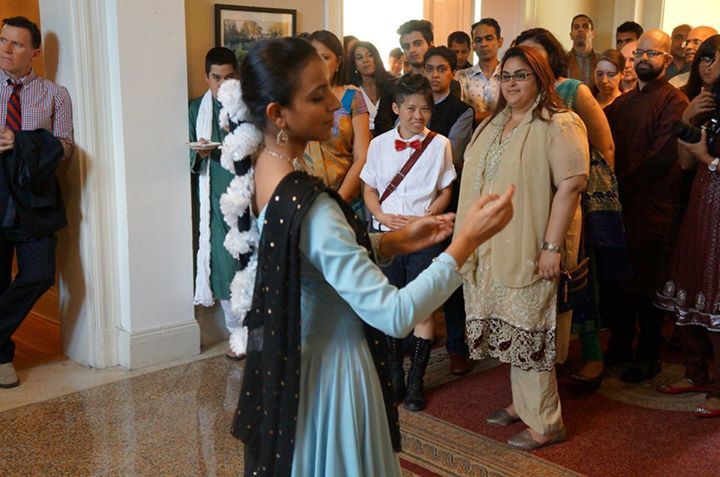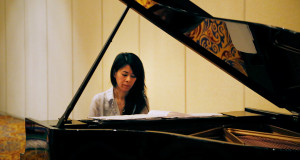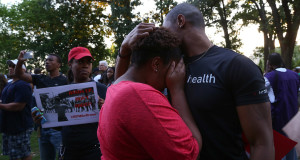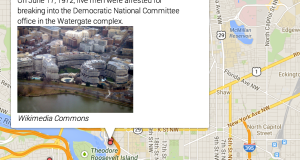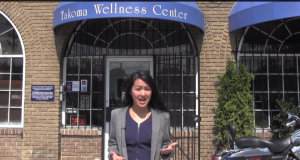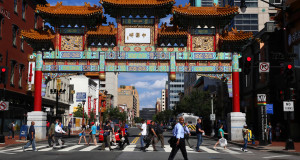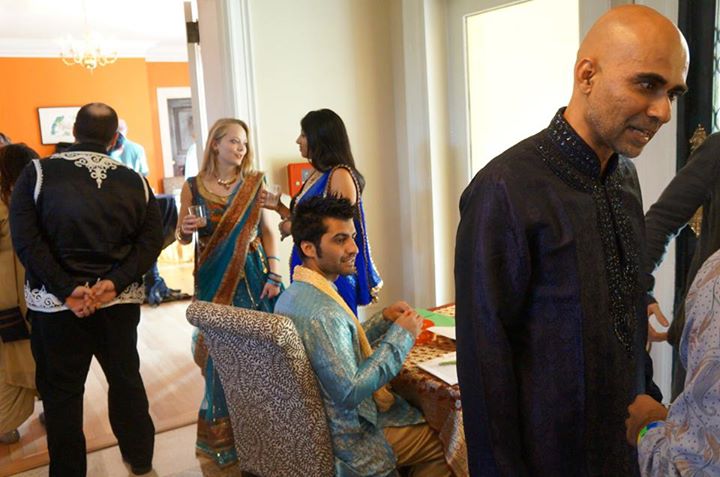
Guests mingle and talk at KhushDC’s 20th anniversary gala earlier this month at the Josephine Butler Parks Center in the District. (Photo provided by KhushDC)
After two decades of leading community gatherings, marching at pride parades and promoting gay rights, Atul Garg and Yassir Islam found themselves recounting the origins of KhushDC to a crowd of longtime supporters at its anniversary gala earlier this month.
The organization began with a meet-up attended by 10 people. Today, the group for South Asian lesbian, gay, bisexual, transgender and queer people in the District has grown to more than 400 active members.
KhushDC provides a voice and visibility for South Asian queers, a term that includes gay and gender-nonconforming people who often find themselves sidelined by the mainstream queer community, said Milap Patel, vice president of KhushDC.
Patel, who is of Indian heritage and hails from Kenya, said that too often people are forced to choose between their South Asian and gay identities in communities dominated by white culture. “Either you can be gay, or you can be South Asian,” he said.
Co-founders Garg and Islam first met in New York at a march observing the 25th anniversary of the 1969 Stonewall riots, an important moment in U.S. LGBTQ history that began after the police raided the gay bar by that name in New York City. In protest, gay people and their allies took to the streets and began organizing more fervently throughout the country to promote gay rights.
“At the parade, we all carried signs from the different South Asian countries, and the crowd cheered us on shouting, ‘Welcome to the United States!’ ” Garg recalled in his speech.
“‘Um, we live here…’ was our response,” he said.
Finding themselves in a crowd of South Asian LGBTQ people for the first time, they decided to start KhushDC when they got back to Washington.
“We didn’t want to be invisible anymore,” Islam said in a video to promote the anniversary gala. “We wanted the world to see that there are South Asians who are gay, lesbian, bisexual, transgender or queer … and we’re no different than anyone else.”
Over the years, the volunteer-run organization has faced its share of challenges, including not having a full-time staff or office space, to the point where it lost momentum and activities dwindled, leading the group to the brink of disbanding. Some of those problems stemmed from a lack of funding.
Today, though, it is thriving.
The initial days of hosting discussions in the living rooms of friends’ apartments have given way to holding regular events such as “Chat ‘N’ Chai” and “Chutney Fridays” at members’ residences and restaurants around the city. On other days, KhushDC might partner with the South Asian Bar Association or host a movie screening.
While the group is South Asian in name — the word “khush” means happy in Hindi-Urdu — its members and allies come from all sorts of backgrounds and places, including Africa and the Far East.
“A lot of the South Asian immigrants that I speak to in the U.S. describe growing up and not ever knowing that there was a vibrant South Asian queer community,” Patel said. In fact, groups like KhushDC exist all across the country to address issues of concern to the community.
When the Indian Supreme Court handed down a ruling in December 2013 that re-criminalized homosexual sex, KhushDC members protested outside the Indian Embassy in Washington at the same time protests were being held in India. The demonstrations may not have swayed the Indian court, but the effort was nevertheless covered by several publications based in India.
Organizers of KhushDC say it can also play a role in educating the people it serves, especially younger people, about expressions and terminology they might not be used to. For example, gender pronouns beyond the two “male” and “female” expressions, such as “their” and “them,” used by many gender-nonconforming people, are not a concept that exists in South Asian culture.
“For me, it’s been a voyage of discovery learning about the queer history associated with so much of South Asian culture … that doesn’t get talked about,” Patel said. “I think it’s very important to make sure that the next generation is aware of what … we’re rooted in.”
Gender concepts in South Asia, for instance, are different. The hijra community in South Asia — which can include transgender and transsexual people — is classified as a third gender that comes with its own sets of societal norms and expectations. There isn’t a large population of hijra people here, mainly because their lesser socioeconomic status doesn’t allow them to emigrate, Patel said. “How do we ensure that our membership is both class- and trans-aware? I think that’s one of the challenges of immigrant communities.”
For one, KhushDC has been thinking about ways to address issues faced by the trans community in the United States. It doesn’t have many transgender members but hopes to become even more inclusive of transgender and gender-nonconforming people.
At the gala, KhushDC invited the queer South Asian duo DarkMatter, spoken-word artists from New York, to perform. One of their poems, titled “Trans/national,” explores the shifting definition of what it means to be a trans person in a male-centric and predominantly white queer culture while also being South Asian.
As Garg summed it up in his speech: “Life then — as well as now — has always been about joyfully and publicly celebrating our LGBTQ and South Asian identities so that none of us ever has to make a choice between the two, ever.”
Follow @sadiakhatri on Twitter.
 VOICES Publishing from the AAJA National Convention
VOICES Publishing from the AAJA National Convention

